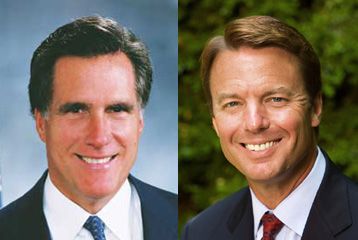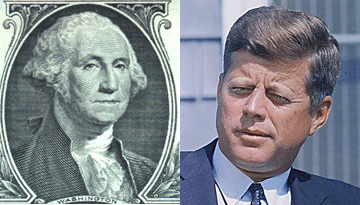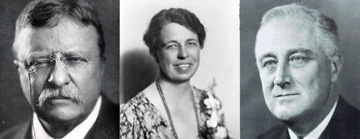Michael Tomasky at the Guardian and Paul Krugman at the New York Times both point to the same phenomenon within the GOP — that the Republican presidential candidates are nearly all promising to continue George Bush’s policies, even though the public hates those policies.
All in all, it’s an economic and political environment in which you’d expect Republican politicians, as a sheer matter of calculation, to look for ways to distance themselves from the current administration’s economic policies and record — say, by expressing some concern about rising income gaps and the fraying social safety net.
In fact, however, except for Mike Huckabee — a peculiar case who’ll deserve more discussion if he stays in contention — the leading Republican contenders have gone out of their way to assure voters that they will not deviate an inch from the Bush path. Why? Because the G.O.P. is still controlled by a conservative movement that does not tolerate deviations from tax-cutting, free-market, greed-is-good orthodoxy.
And Tomasky writes,
It’s pretty astonishing, really – we’re at the tail end of a failed presidency, and the people running to succeed it are promising to continue its failed policies.
Now, many observers would say, well, they’re just pandering to their party’s rightwing base, and once one of them secures the nomination, he will tack to the centre. Undoubtedly, he will, for tactical reasons. But the real question is how the next Republican will govern should he happen to win. And the answer to that question is that there’s every reason to assume that he will be just as a conservative as Bush for one simple reason: the interest groups that run the GOP will not brook much deviation from the standard line.
Those interest groups are three. The neocons run foreign policy – the Iraq disaster has not affected their influence in the GOP one whit. The theocons run social policy. And the radical anti-taxers run domestic policy. Until forces inside the GOP rise up to challenge these interests, any Republican administration will be roughly as conservative as Bush. The candidates have slightly different theories of stasis, they will tinker around this edge or that, but that’s about all you can say.
Both Tomasky and Krugman point to John McCain as someone who has utterly sold out. Krugman writes,
Mr. McCain’s lingering reputation as a maverick straight talker comes largely from his opposition to the Bush tax cuts of 2001 and 2003, which he said at the time were too big and too skewed to the rich. Those objections would seem to have even more force now, with America facing the costs of an expensive war — which Mr. McCain fervently supports — and with income inequality reaching new heights.
But Mr. McCain now says that he supports making the Bush tax cuts permanent. Not only that: he’s become a convert to crude supply-side economics, claiming that cutting taxes actually increases revenues. That’s an assertion even Bush administration officials concede is false.
Oh, and what about his earlier opposition to tax cuts? Mr. McCain now says he opposed the Bush tax cuts only because they weren’t offset by spending cuts.
Aside from the logical problem here — if tax cuts increase revenue, why do they need to be offset? — even a cursory look at what Mr. McCain said at the time shows that he’s trying to rewrite history: he actually attacked the Bush tax cuts from the left, not the right. But he has clearly decided that it’s better to fib about his record than admit that he wasn’t always a rock-solid economic conservative.
(See also “McCain’s Unlikely Ties to K Street.” The boy has utterly sold out every principle he ever had. He stood up to torture but not to the GOP Powers That Be.)
Tomasky:
And yet, by and large, the Republican candidates are running on exactly the same policies that Bush has pursued. Consider this list. All the major Republican candidates want to “stay the course” in Iraq, denouncing any discussion of withdrawal as evidence of pusillanimity. All see the fight against terrorism in more or less Bushian terms. All want to make the Bush tax cuts, now scheduled to sunset in 2010, permanent – even John McCain, who at the time voted against them. All have promised the leaders of the Christian right that they will appoint supreme court judges “in the mould of” Antonin Scalia and Clarence Thomas.
What this euphemistic language means is that whatever a candidate’s previous positions on abortion and gay rights – Rudy Giuliani, for instance, has supported both – the leaders of the religious conservative movement have exacted commitments from all the Grand Old Party candidates to appoint the kind of judges they want, and that matters far more than past positions.
There’s more. Healthcare is a priority in this election. But to hear these Republicans, you’d never know it. Their healthcare plans range from cynical to inadequate. Climate change? They barely acknowledge the problem and are particularly loath to acknowledge that human activity has contributed to it. They continue to insist, as Republicans since Ronald Reagan have, that the only real domestic enemy the American people face is the federal government, which they continue to want to starve.
Of course, the GOP candidates are not coming out and saying they are going to continue George Bush’s policies. From what I’ve seen (from a distance, here in New York), they are pretending George Bush doesn’t exist. But they’re singing the same old song Republicans have been singing since Reagan — cut taxes, shrink government, love God, hate minorities, and kick foreign ass.
These viewpoints long have been sponsored by the Moneyed Elite, who have used their vast media infrastructure to persuade un-elite Americans that these are the opinions they should have, too. And they’ve gotten away with this for a long time. But E.J. Dionne says there’s a different wind blowing in Iowa:
Us-vs.-them economic rhetoric is often said to be out of date, impractical, even dangerous. But in the closing days of a very tight race, Edwards has his opponents, particularly Barack Obama, scrambling to make sure a trial lawyer from North Carolina does not corner the market on populism.
Obama is vying with Edwards for the non-Clinton vote, and the Illinois senator was on the air yesterday with an Edwards-like television ad assailing the flow of American jobs abroad. Obama spoke last week of “Maytag workers who labored all their lives only to see their jobs shipped overseas; who now compete with their teenagers for $7-an-hour jobs at Wal-Mart.” He had heard from seniors “who were betrayed by CEOs who dumped their pensions while pocketing bonuses, and from those who still can’t afford their prescriptions because Congress refused to negotiate with the drug companies for the cheapest available price.”
Even Hillary Clinton, whose discourse is typically longer on policy details than egalitarian wrath, told an appreciative crowd in Story City last week that the “interests of working middle-class families” had been “subordinated to the interests of the wealthy and well-connected” and that the Bush administration acted on the mortgage crisis “only after Wall Street began to feel the credit crunch.” She promised to “end the student loan industry’s scams, which have ripped off families” and condemned “no-bid contracts,” “cronyism” and “corruption.”
Since the Reagan era, the heroes of the nation’s economic story have been valiant entrepreneurs who “took risks” and “created wealth.” This narrative advanced the Republican cause and seeped deeply into the Democratic Party. If Iowa is any indication, there is a new narrative in which the old heroes are cast as the goats of the story and the new heroes are people like “the guy in Orange City.” There is a thunder out of Iowa, and it is shaking both parties.
Of course, the majority of the punditocracy, especially the ones who are incessantly on television, will not notice this trend. They will continue to insist the American people want tax cuts more than they want health care, and if economic populism does determine the outcome of the 2008 elections, the bobbleheads will be caught totally off guard. And then they’ll come up with a reason why the elections weren’t really determined by economic populism. Just watch.
What is harder to predict is what will happen to the GOP if it loses the White House and more seats in Congress by a decisive margin in November. In a normal world, such a defeat would cause a massive re-alignment of power within the Republican Party, allowing “moderate” (i.e., possibly not crazy) Republicans to come to the forefront and take over party leadership. But the Moneyed Elite will still own the party, so it’s possible that can’t happen no matter what.




